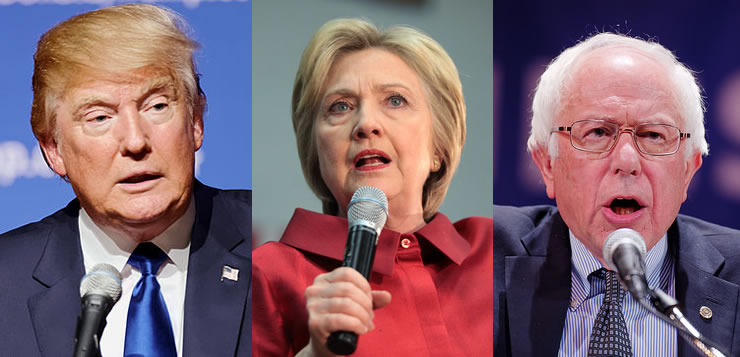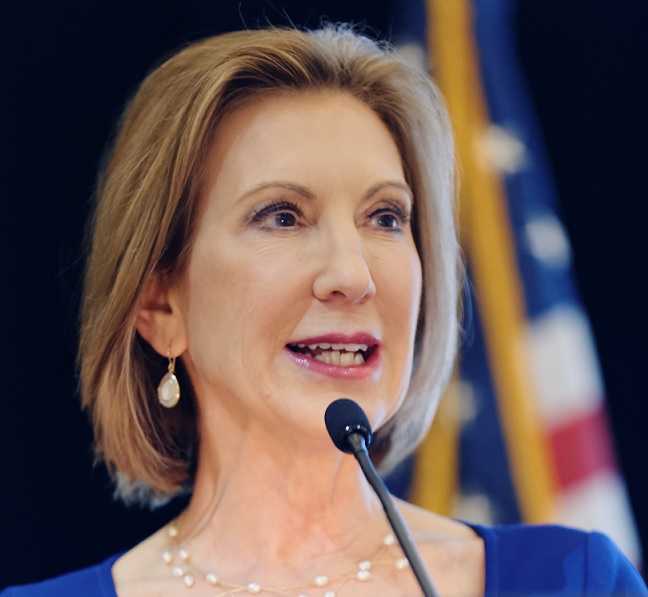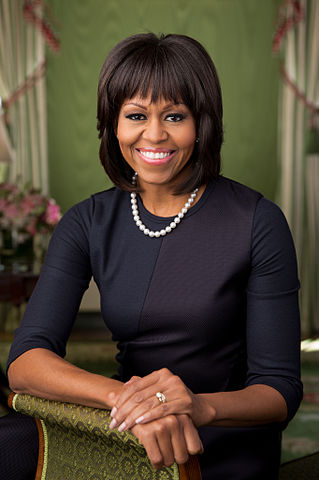You don’t have to run for office to speak like a president. Practice these four tips to sound presidential and take your speaking to the top.
What Donald, Hillary, and Bernie Taught Us About Presentations
 This U.S. presidential election was like no other. Hillary Clinton and Donald Trump went head-to-head in a heated debate with more twists and turns than a roller coaster ride. The ongoing soap opera kept people riveted to their screens -- sometimes inspired and other times disgusted. Regardless of the outcome, there were lessons learned about public speaking.
This U.S. presidential election was like no other. Hillary Clinton and Donald Trump went head-to-head in a heated debate with more twists and turns than a roller coaster ride. The ongoing soap opera kept people riveted to their screens -- sometimes inspired and other times disgusted. Regardless of the outcome, there were lessons learned about public speaking.
Here some presidential guidelines to deliver winning presentations:
Deliver a Message that Resonates -- To be effective in any presentation, a public speaker must have a message that resonates with the audience. While sizzle is important, if the message doesn’t speak directly to the self interests of the audience, it won’t be remembered and it won’t move the crowd.
Both Sanders and Trump leveraged the emotions of the audience and spoke directly and specifically to their frustrations, problems, and concerns. To resonate with an audience the presenter needs to speak simply, use shorter words, and to tell stories that relate to what the audience believes and experiences. When the presenter speaks their language, the audience feels heard, understood, and connected. And that builds trust.
Smile and Deflect -- At some point every public speaker will encounter resistance or hostility. The worst approach is to get defensive. When you play your opponent’s game, you lose. The debates got nasty at times. When Trump attacked Hillary, she reacted by smiling until it was her turn to rebut. Hillary showed poise under pressure. In situations other than a debate, the presenter can involve the audience to deflect hostility. There’s nothing more powerful than peer pressure.
Do the Unexpected -- Attention spans are growing shorter. There’s now research that states that the attention of a goldfish is one second longer than that of a human. Yikes! To keep an audience engaged and attentive, be different.
Trump broke the rules. He was unpredictable and said things that were politically incorrect. The audience found it refreshing because he said what they were thinking. When presenters avoid naming the elephant in the room, the audience retreats and resists. It’s difficult to be influential if you tiptoe around the truth. (Yes, he went too far, and lost credibility for being inappropriate to say the least). When used appropriately, the element of surprise will keep the audience with you.
Get Personal -- All three candidates showed a personal side of themselves by involving their family and sharing stories. Every audience is thinking three things subliminally -- Who are you? Who are you to tell me? What’s in it for me?
An audience first wants to know the presenter as a person, not as a talking head. Sharing personal stories and talking about one’s family humanizes the speaker. Substance without personal connection will not yield results. An audience relates to people they know, like, and trust. Never underestimate the likability factor.
Be Gracious Victory and Defeat -- Sometimes you win, sometimes you lose. It’s true in politics, sports, and at work. A gloating winner or a sore loser will cast themselves in a negative light. What separates the ordinary from the great is how a presenter handles victory and defeat. When Donald won the election, he complimented Hillary on her toughness, hard work, and service. Bernie and Hillary were gracious when they conceded the election. Hillary’s concession speech inspired the country to unite and paved the way for a new administration. This is truly the mark of leadership.
Most of us will never run for office but we can take a page out of the election playbook and remember to apply the good, and eliminate the bad and the ugly.
Stay on Message Without Being Scripted
 In a Republican debate, Senator Marco Rubio had emerged as a great orator and touted his third place standing as a win. There was a lot of buzz about Rubio and he was riding high despite being number three. So it was no surprise that he walked into the next debate confident and expecting more of the same.
And then it happened. Governor Chris Christie hammered him. Christie came down hard on Rubio for reciting his message point for a third time and accused him of being scripted. It didn't go well for Rubio and Christie won that round.
In a Republican debate, Senator Marco Rubio had emerged as a great orator and touted his third place standing as a win. There was a lot of buzz about Rubio and he was riding high despite being number three. So it was no surprise that he walked into the next debate confident and expecting more of the same.
And then it happened. Governor Chris Christie hammered him. Christie came down hard on Rubio for reciting his message point for a third time and accused him of being scripted. It didn't go well for Rubio and Christie won that round.
How can the skill of staying focused and on message be to the detriment of a public speaker? As a speaking strategist and media trainer, I advise my clients to know their message and to stay on message. This is especially important in a media interview. A skilled media guest will lead with key messages and weave them throughout the interview.
The red flag is when the presenter doesn't answer the question and defaults to a message that doesn't follow the line of questioning. What should Rubio have done? Answer the question to the best of his ability without repeating the same message point again.
Most of us won't be running for office or even presenting in a formal debate. But we will need to persuade, convince, and inform our stakeholders. I advise audiences and clients to familiarize, don't memorize. When a public speaker repeats the same points too close together and uses the exact same words, that's when authenticity is lost. That sounds scripted.
The first mistake is reading a manuscript word-for-word. It takes a special skill and much practice to deliver the words so it doesn't sound like you're reading text. Some scientific lecturers stand and read their research. I told them, "I can read as well as you." Why would anybody want to listen to the reading of a research paper?
The second mistake is memorizing word-for-word. Even though the presenter is not reading, it's obvious the message is not natural.
When I first started out in the speaking business, I worked for a seminar company. At the end of every seminar my manager and I would read the reviews. To my surprise, someone wrote, "Diane, though, helpful, sounded canned." Yikes! Put a stake in my heart. But I realized that I had memorized the script they gave me and I sounded like a talking head. With practice, I learned how to sound conversational and make the content natural.
Audiences are more sophisticated than ever. They want to hear a subject matter expert and not a presenter giving a book report. They want to know you're authentic. You achieve that by preparing your message, practicing your message, and listening for when to divert from the message. It's in listening that we become truly authentic.
And the Best Speaker Is....
 Speaking is a leadership skill. Period. It's difficult to lead if you can't convey a clear, compelling message that inspires and moves people to action.
Last night the candidates eagerly awaited the results of the Iowa Caucus. It was a tight race with Hillary Clinton and Bernie Sanders almost tied. But the real winner was the orator of the night-Marco Rubio.
Speaking is a leadership skill. Period. It's difficult to lead if you can't convey a clear, compelling message that inspires and moves people to action.
Last night the candidates eagerly awaited the results of the Iowa Caucus. It was a tight race with Hillary Clinton and Bernie Sanders almost tied. But the real winner was the orator of the night-Marco Rubio.
While Ted Cruz came in first, his victory speech was too long, too analytical, and not inspiring. I kept changing the station in search of commentator's reviews. Each time I toggled back, there was Ted, still droning on. This was a lost opportunity to inspire and build excitement for the next race. I didn't remember much of his speech.
Donald Trump came in a close second. The usually pompous, bombastic Trump took it down a notch and gave a gracious concession speech. He thanked and acknowledged the people of Iowa and congratulated Ted Cruz. This was a different Donald Trump and he won points in building trust with his followers. He kept his remarks brief and didn't make excuses. This was a model for losing gracefully and yet not giving up. In keeping with his entrepreneurial personality, he cut his losses quickly and moved on to the next phase.
The real stand-out was Marco Rubio who was neck-in-neck with Mr. Trump. While his speech was well-prepared, his words and delivery were passionate and heartfelt. He stayed on message with his immigrant story, his family values, and the need to conquer the competing party. We could relate to his classic hero's journey. " This is the moment they said would never happen. For months they told us we had no chance. They said I had to wait my turn". . Although his speech was criticized for sounding much like Obama's speech back in 2012, he left his constituents inspired, exhilarated, and confident in his leadership. Rubio turned a third place result into a victory speech.
On the Democratic side, Hillary Clinton was at her best. Her fire was not only in her belly but on display in her eyes. She also gave a victory speech even though the results were too close to call. Mrs. Clinton connected with her audience and carried her enthusiasm with her as she exited the stage.
Bernie Sanders, although older than Clinton, communicates energy. He, too, was impassioned in his delivery. The young people not only fed off his message of free college and taxing Wall Street, but his energy and strong conviction connected with this audience. He regarded the evening as a tie with Clinton and expressed confidence in winning New Hampshire. Energy sells.
Will the best speaker win? Not necessarily.There's more to winning a political race than public speaking. But excellent presentation skills will elevate a candidate's leadership, enhance the brand, inspire trust and confidence. Words well written and delivered with absolute conviction and passion will always linger in the hearts and minds of the listeners.
What Carly Fiorina Knows About Public Speaking Gravitas
 Is public speaking the key to winning an election? At the beginning of the debate 40% of the people didn't know Carly Fiorina. According to the google heat map, 82% googled her after her public speaking success. Whether you like her or not, clearly, she gave a stellar performance. She was a stand out among her peers, exuding executive presence and gravitas. What does that mean? If you define gravitas as decisiveness, poise under pressure, assertiveness, and confidence, Carly had it in spades.
Is public speaking the key to winning an election? At the beginning of the debate 40% of the people didn't know Carly Fiorina. According to the google heat map, 82% googled her after her public speaking success. Whether you like her or not, clearly, she gave a stellar performance. She was a stand out among her peers, exuding executive presence and gravitas. What does that mean? If you define gravitas as decisiveness, poise under pressure, assertiveness, and confidence, Carly had it in spades.
Her presentation was clear, focused, and direct. Her tone was confident and not overly emotional. When questioned, she didn't miss a beat. Carly's speech was devoid of hesitations and fillers yet she did not sound canned. Her responses were well thought out and when pressed, she responded with explanations, not defensiveness. Contrasted to Donald Trump, who responded with anger, Carly appeared in control and presidential. Granted, she was not questioned by Megyn Kelly. But the mark of a true leader is to deflect hostile questions and bridge to the message points. Based on her performance in the first debate, there's a good chance she'd be able to handle tougher questioning. As a result of her presentation, she increased her name recognition.
Public speaking is the new competitive advantage. What sets you apart from the competition is your presentation. This was evident when watching some of the other candidates. Although they may have had greater name recognition and a resume of accomplishments, a few candidates came across as flat or nervous. Others were confrontational. Can public speaking be the key to winning an election? Probably not when politics are at play. But the best leaders are great communicators. In politics and in business, excellent presentation skills will make you memorable, extend your brand, and build confidence in your leadership.
3 Presentation Screw-Ups By the GOP Debate Moderators
 After watching the first GOP Debate on TV, I was struck at the lack of skill of some the moderators. These are professional broadcast journalists and you would think their public speaking training in front of the camera would be evident.
After watching the first GOP Debate on TV, I was struck at the lack of skill of some the moderators. These are professional broadcast journalists and you would think their public speaking training in front of the camera would be evident.
Here are three mistakes a professional moderator should avoid:
1. Grammatical Errors. One of the male moderators actually said, "Was wrote" instead of "Was written." Don't they teach grammar in school anymore? It made him sound uneducated and I wondered how he was selected for this position. It takes more than good looks to moderate a television debate. He lost credibility.
2. Citing an Opinion or Irrelevant Remarks. A professional moderator asks provocative questions but doesn't make remarks like one of the moderators did tonight. Governor Perry said that in his first day in office he'd need a bottle of white out to erase all the executive orders of the previous administration and it would be a long day. The moderator quipped, "Yes, that would be a long day". There was no reason to comment. This is not a one-on-one discussion. The moderator is not there to validate the candidate. The goal is to stay neutral.
3. Not Getting to the Point. A female moderator didn't seem to understand the difference between asking a question and giving a speech. She delivered a lead in of about three sentences before she posed the actual question. We don't need background information. Just ask the question! Not only is this frustrating to the audience, but it signals that the moderator is not a clear thinker or communicator. It's a communication style of a novice.
The good news is you don't have to fear public speaking. If professional broadcasters are making these mistakes you don't have to worry that you'll derail on the platform. Learn from their mistakes and keep these points in mind whenever you're the moderator or a public speaker.
Fundraising Presentations? Father Knows Best
 Political candidates spend millions of dollars on advisers, media training, speech coaching, and advertising campaigns. They curry favor with influential movers and shakers to get them to speak on their behalf. But the best political strategy is rarely utilized. Robert F. Kennedy used it. George W. Bush used it. Even Andrew Cuomo used it.
A political candidate's best bet is often a public speaker in his or her own backyard. When Robert F. Kennedy's campaign was floundering, he brought in Rose Kennedy who quickly took the mic. Jenna and Barbara Bush both spoke on behalf of their dad, George W. Bush. Andrew Cuomo had his younger daughter speak about his softer side (kids are often the best fundraisers). All three candidates won.
Political candidates spend millions of dollars on advisers, media training, speech coaching, and advertising campaigns. They curry favor with influential movers and shakers to get them to speak on their behalf. But the best political strategy is rarely utilized. Robert F. Kennedy used it. George W. Bush used it. Even Andrew Cuomo used it.
A political candidate's best bet is often a public speaker in his or her own backyard. When Robert F. Kennedy's campaign was floundering, he brought in Rose Kennedy who quickly took the mic. Jenna and Barbara Bush both spoke on behalf of their dad, George W. Bush. Andrew Cuomo had his younger daughter speak about his softer side (kids are often the best fundraisers). All three candidates won.
You don't need professional speakers. Have your family speak on your behalf.
Public speaking is not simply about good rhetoric. The messenger is as important as the message. I was reminded of this when I received this fundraising email from a candidate's father. While this is by no means a political endorsement, I do admire and commend the approach and the message. This is more powerful than any other kind of presentation, whether spoken or written. It's all about family.
Diane,
I’m just a few moments away from boarding a plane bound for Uganda. This is the first time my family will set foot in this country since we were expelled in 1972.My daughter, Reshma, can’t be with us today because she’s in New York fighting for people like me, like us.
I came here as a political refugee. I had to change my name from Mukund to Mike, so I could find work. It wasn’t easy for us.
Reshma saw us struggle, and she learned to fight to create better opportunities for families like ours.
Now, Reshma’s opponent has launched the first attack in the Public Advocate campaign. She’s saying that Reshma is out of touch with working people.
Out of touch? Not my daughter.
Reshma is a former Deputy Public Advocate, and the founder of Girls Who Code. Reshma has spent her life fighting to create better opportunities for underserved and disadvantaged people.
She needs your help right now to fight back. Will you help her out?
If you can’t volunteer, will you please donate $19.72 now to help her out?
Thank you for supporting my daughter.
Best, Mukund Saujani
Obama Needs to Fire His Debate Coach
 The first presidential debate on October 3, 2012 belongs to Mitt Romney. It was a clear win in terms of content and delivery. Both candidates began cordially and gracefully. The President acknowledged his wife on the evening of their 20th anniversary. Mitt Romney also congratulated him and quipped about how Obama probably didn't want to spend a romantic evening on stage with him.
Both candidates are skilled public speakers. They each looked presidential but Romney owned the room with his rapid fire responses, his knowledge of the facts, and his aggressive approach. He seemed more relaxed and natural and was finally able to humanize his image by talking about people he had met on the campaign trail and correcting any inaccuracies about his policies. What was especially effective was his ability to speak crisply as he quickly enumerated three to four points he wanted to make. He made direct eye contact with Obama and his passion was evident. Gone was his robotic delivery.
The first presidential debate on October 3, 2012 belongs to Mitt Romney. It was a clear win in terms of content and delivery. Both candidates began cordially and gracefully. The President acknowledged his wife on the evening of their 20th anniversary. Mitt Romney also congratulated him and quipped about how Obama probably didn't want to spend a romantic evening on stage with him.
Both candidates are skilled public speakers. They each looked presidential but Romney owned the room with his rapid fire responses, his knowledge of the facts, and his aggressive approach. He seemed more relaxed and natural and was finally able to humanize his image by talking about people he had met on the campaign trail and correcting any inaccuracies about his policies. What was especially effective was his ability to speak crisply as he quickly enumerated three to four points he wanted to make. He made direct eye contact with Obama and his passion was evident. Gone was his robotic delivery.
What was missing last night was President Obama's trademark confidence. He looked downward as Romney was speaking. His body language was weaker than expected and he would have been better served by standing with his shoulders back and making direct eye contact. He still needs to speak more crisply to be more impactful.
The real loser in this debate was Jim Lehrer, an accomplished journalist and moderator who seemed to be off his game. He acknowledged they had gone over their time and Romney seemed to take advantage of Lehrer's loose time-keeping.
As in any speech, or media presentation, public speaking skills are very important. But visual images can send a strong message. At the end of the debate, Michele stepped on stage to greet her husband. At the same time, Romney's wife and five sons joined him on stage for a victory hug creating an image of strong support.
Romney won the first debate on domestic policy. Will he be able to keep the momentum in the second debate? Will Obama rise to the challenge? What do you think?
Why Romney's Presentation Failed And What He Can Do About It
 The political stage is a fascinating study of the power of the presentation. When it comes to public speaking and media training, Romney has two areas to address. Unless he can improve these two areas, he will plummet in the polls.
The political stage is a fascinating study of the power of the presentation. When it comes to public speaking and media training, Romney has two areas to address. Unless he can improve these two areas, he will plummet in the polls.
The first area is language.
Romney's recent remarks which were secretly recorded have been replayed continuously in the media. He stated, "There are 47% of the people who will vote for the president no matter what." If Romney had made that one statement his presentation and media image may have been salvaged.
His presentation derailed with this next statement. "There are 47% who are with him, who are dependent on government, who believe that, that they are victims, who believe that government has the responsibility to care for them. Who believe that they are entitled to health care, to food, to housing."
His first statement that 47% will vote for the president is a marketing decision. He's saying that's not his target market. In any campaign, the candidate or marketer will focus time, effort, and money where there will be the greatest return. In other words, he knows they're not his fans.
The second statement felt like an attack and many people reacted negatively. Given that part of the 47% are elderly it sounded callous although that was not the intent. A good media trainer would advise him to quickly apologize for misspeaking and to reword his statement. The challenge for all politicians and any public speaker in the limelight is that the media can take one soundbite and kill your reputation. Persons in the eye of the media must remember that they are always being recorded and that even speaking one-to-one is public speaking.
Remember when Jessie Jackson was a presidential candidate and made a religious slur in New York City? He was talking to an individual and someone in the crowd overheard him and reported it. Although he wasn't recorded, it had the same effect on his presentation and reputation.
For the non-famous public speakers, once you leave the stage, you're forgotten. But if you're a politician the media will replay and spin your presentation into the stratosphere.
The second area is delivery.
Romney looks and speaks like an executive. But like Al Gore, he appears stiff. When he says he cares about the poor and middle class the message lands as facts rather than warmth. Yet, when he's on a talk show he's more relaxed and his personality comes through. As a public speaker he needs to enhance his presentation with more self disclosure, personal stories, and more effective language. When he speaks with passion and can convey caring he'll increase his ability to connect.
These comments are non-partisan and related to the presentation of the candidate and not policies. What do you think Romney needs to do to improve his presentation in the media?
Gifted Speakers are Born, Effective Speakers are Made and Bill Clinton is.....
 Bill Clinton is a rock star on the speaking platform and the ultimate spin meister. I tell my audiences that gifted speakers are born. Most public speakers will never reach the level of a Martin Luther King. Not even most professional speakers achieve that height. Some speakers have a special gift-an ability to move the masses, entertain the crowd, speak off the cuff, and sway an audience.
And last night at the Democratic Convention, Clinton demonstrated all of it and then some. As I anticipated his speech, I wondered how he was going to excite the crowds when the facts pointed to high unemployment, lower wages, and a general discontent with the economy. Well, it didn't take him long to put a position spin on the situation. How did he do it?
Bill Clinton is a rock star on the speaking platform and the ultimate spin meister. I tell my audiences that gifted speakers are born. Most public speakers will never reach the level of a Martin Luther King. Not even most professional speakers achieve that height. Some speakers have a special gift-an ability to move the masses, entertain the crowd, speak off the cuff, and sway an audience.
And last night at the Democratic Convention, Clinton demonstrated all of it and then some. As I anticipated his speech, I wondered how he was going to excite the crowds when the facts pointed to high unemployment, lower wages, and a general discontent with the economy. Well, it didn't take him long to put a position spin on the situation. How did he do it?
Purpose: Clinton stated clearly and succinctly his intention. "Now, Mr. Mayor, fellow Democrats, we are here to nominate a president... and I’ve got one in mind."
Positioning: He introduced the President by highlighting his background of triumph over tragedy and quickly spoke of the challenging economy he inherited. Right up front he presented the elephant in the room and established an expectation of a long road toward recovery. He quickly addressed the questions or objections in the minds of the audience.
"I want to nominate a man whose own life has known its fair share of adversity and uncertainty. I want to nominate a man who ran for president to change the course of an already weak economy and then, just six weeks before his election, saw it suffer the biggest collapse since the Great Depression, a man who stopped the slide into depression and put us on the long road to recovery, knowing all the while that no matter -- no matter how many jobs that he saved or created, there’d still be millions more waiting, worried about feeding their own kids, trying to keep their hopes alive."
Personalization: Clinton acknowledged Mrs. Obama by saying "And by the way, after last night, I want a man who had the good sense to marry Michelle Obama."
Pandering: He acknowledged the Vice-President and the President but gets his plug in for Hillary.
"Joe Biden did a great job with both. Now -- now, he -- President Obama -- President Obama appointed several members of his cabinet, even though they supported Hillary in the primary. Heck, he even appointed Hillary. Now, wait a minute. I am -- I am very proud of her. I am proud of the job she and the national security team have done for America."
Provoking: As expected he took shots at the opposition, but here he provoked emotion. "I often disagree with Republicans, I actually never learned to hate them the way the far right that now controls their party seems to hate our president and a lot of other Democrats."
Passion: True to form, nobody can accuse Bill Clinton of low affect. From his broad, sweeping gestures to his finger pointing, from his direct sustained eye contact, to his powerful and emotional voice, passion is his middle name. It doesn't matter whether the facts are on his side or whether he omits information. People believe him because he's able to stir their emotions and whip up excitement with his strong conviction and confident delivery. He's a natural off the cuff speaker which gives him that folksy speaking quality. This is a public speaker who is never at a loss for words and always goes over his time limit. (I must confess, I went to bed before the end of his speech).
A true public speaking master, Bill Clinton used all the rhetorical devices without making them sound like techniques. Like him or not, call him a snake oil salesman if you will, Clinton is the poster boy for persuasive presentations.
Michelle Obama's Speech: Poise, Passion, Presence
This post originally appeared on September 5, 2012.

Michelle Obama gave a knockout presentation. Her speech last night at the convention wowed the crowds and she was the epitome of confidence. It began with her entrance on stage. She smiled warmly as she waved to the crowd and waited for the applause to die down. Her voice was passionate and she radiated an energy that communicated she was happy to be here. She has mastered public speaking.
Throughout her presentation, Mrs.Obama connected with the audience. She sustained eye contact throughout her speech and it was not evident that there was a teleprompter. Too often, public speakers look nervous because of wavering eye contact or lose credibility because they look like they're reading. Strong eye contact combined with her warm smile endeared Mrs. Obama to the audience. They experienced her words as heartfelt as she described the modern day heroes she encountered in her travels.
She also leveraged the power of story and was at her best when she talked about her early life with the president and her personal concerns about giving her girls a normal life in the White House. Her shared experience of growing up with similar values like her husband's and working their way out of poverty was the classic rags to riches story that every person can relate to. It's the classic American Dream.
The speech was skillfully crafted to build from the struggles of her parents and in-laws to the current challenges and policies facing the nation. It was a subtle way of addressing issues without being dogmatic. As a parent, Mrs. Obama painted a picture of a strong family who is grappling with the same challenges that all families face.
She spoke sincerely and her challenge was non-confrontational "…we must work like never before…and we must once again come together and stand together for the man we can trust to keep moving this great country forward…my husband, our President, President Barack Obama."
Mrs. Obama understood that the purpose of the presentation was not to be a politician but to show the personal side of the president and gain the public's confidence in his leadership. She maintained that balance of confident public speaking with a personal passion and warmth.
The lessons for public speakers? Prepare and practice so that your presentation looks seamless. Connect with your eyes and let your warmth come through. Speak from the heart and tell your story. The rest is just technique. https://www.youtube.com/watch?v=jUpN6klYP9o
Public Speaking and Politics: It’s All About the Story
 Last night at the Republican convention, we witnessed public speakers who nailed their presentations. What do Paul Ryan, Condolezza Rice, and Susana Martinez have in common as public speakers? Each and everyone of them shared a personal story.
Susana began by telling the story of her immigrant parents.
Last night at the Republican convention, we witnessed public speakers who nailed their presentations. What do Paul Ryan, Condolezza Rice, and Susana Martinez have in common as public speakers? Each and everyone of them shared a personal story.
Susana began by telling the story of her immigrant parents.
“Growing up I never imagined a little girl from a bordertown could one day become a governor. But this is America…My parents taught me to never give up and to always believe that my future could be whatever I dreamt it to be.
We grew up on the border and truly lived paycheck to paycheck. My dad was a golden gloves boxer in the Marine Corps, then a deputy sheriff. My mom worked as an office assistant. One day they decided to start a security guard business. I thought they were absolutely crazy. We literally had no savings. But they always believed in the American dream.”
By the reaction of the audience, it was evident that they could relate to the governor's rags to riches story.
Condolezza told of her upbringing as a Black child in the South.
“And on a personal note, a little girl grows up in Jim Crow Birmingham - the segregated city of the south where her parents cannot take her to a movie theater or to restaurants - but they have convinced her that even if she cannot have a hamburger at Woolworths, she can be the president of the United States if she wanted to be, and she becomes the secretary of state.”
Finally, Paul Ryan started to tear up as he spoke about his mother.
“My Mom started a small business, and I've seen what it takes. Mom was 50 when my Dad died. She got on a bus every weekday for years, and rode 40 miles each morning to Madison. She earned a new degree and learned new skills to start her small business. It wasn't just a new livelihood. It was a new life. And it transformed my Mom from a widow in grief to a small businesswoman whose happiness wasn't just in the past. Her work gave her hope. It made our family proud. And to this day, my Mom is my role model.”
Paul Ryan, along with the other speakers injected humor and poked fun at Mitt Romney. When acknowledging the generational difference between Romney and himself, he stated,
“There are the songs in his Ipod, which I have heard on the campaign bus.... and I have heard it on many hotel elevators. He actually urged me to play some of these songs at campaign rallies. I said, ``Look, I hope it is not a deal breaker Mitt, but my playlist starts with AC/DC and it ends with Zeppelin.” Ryan ended the speech by bringing his family on stage.
There were many effective public speaking techniques that the speakers used during their presentation-humor, passion, and repetition. But by far, the one skill that connects with an audience is the personal touch. Every audience wants to know three things: Who are you? Who are you to tell me? What’s in it for me? It’s not the facts that move an audience, it’s emotions that get them on their feet.
The audience got a look into the lives of these three presenters and got to know them on a personal level. This will be a challenge tonight for Mitt Romney who tends to be more mechanical and reserved in his presentation. He may be on top of his facts, he may have a plan for turning around the country. But most Americans are thinking, "Who is he?" In order to connect with his constituents, he will need to connect on an emotional level. And nothing is more emotionally powerful than a personal story.

